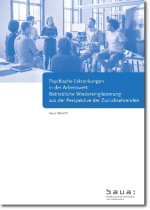Return to work after sickness absence due to common mental disorders from the employees' perspective
(in German)
Background: Return to Work (RTW), especially after common mental disorders, is a complex process that has received little attention in German research so far. Quantitative studies indicate that a combination of medical-therapeutic and work-related measures might lead to a successful RTW. Qualitative studies conclude that individual, social and operational factors are important. Objective: The study aimed to analyse the experience, behaviour, and actions from the perspective of the returning employees in the RTW process with regard to its success and sustainability, starting with the treatment after a mental crisis up to the return to the workplace.
Methods: The qualitative section of the study was part of a mixed-methods follow-up study. A qualitative sub-sample (n=32) was selected from the quantitative study sample (n=286). Narrative-based interviews were carried out at three measurement points. The digitally recorded interviews lasted around 45 minutes on average. They were transcribed and evaluated using the Documentary Method of Interpretation developed by Bohnsack.
Results: The interviewees were predominantly highly motivated employees and just as motivated to return to work. They described various factors that contributed to the development of their mental crisis: the work itself and their attitude towards work, private and biographical circumstances as well as combinations of these factors. Three risk patterns can be derived from the interviews, which are relevant for the treatment process and RTW. Simultaneously, six types of orientations that reflect the employees' path into the crisis were reconstructed: the more complex the conditions are, the more difficult the RTW process becomes and requires different RTW strategies. Central factors that positively influence the behaviour and actions of the returning employees were identified as follows: (1) self-efficacy (SE) and (2) prosocial coping of the employees, (3) the social support of supervisors and colleagues, (4) the employer's duty of care, as well as (5) a professional RTW coaching for employees with special needs. After one year of return, the sustainability is determined by (a) a positive attitude towards work, (b) an improved performance and resilience, (c) a confident handling of the disease, (d) a stable SE, (e) a good atmosphere in the work team, (f) an adequate balance between work and private life and (g) an overall positive RTW trajectory.
Conclusions: Overall, RTW can be understood as a coherent and continuous process. At the same time, successful and sustainable RTW can be described as a resource-oriented process. In this study, SE appears to be a central resource during RTW. Returning employees use their SE in order to actively manage the crisis and help shape the return equally. They succeed if they actively seek help and adopt an open-minded attitude towards cooperation, by applying positive interaction (prosocial coping). Besides, the findings from this study can be used for the development of actions to promote early detection of mental crises in the workplace.
Please download the complete report "Return to work after sickness absence due to common mental disorders from the employees' perspective" (in German only).
Bibliographic information
Title: Psychische Erkrankungen in der Arbeitswelt: Betriebliche Wiedereingliederung aus der Perspektive der Zurückkehrenden.
1. edition. Dortmund: Bundesanstalt für Arbeitsschutz und Arbeitsmedizin, 2021. pages: 70, Project number: F 2386, PDF file, DOI: 10.21934/baua:bericht20210127
